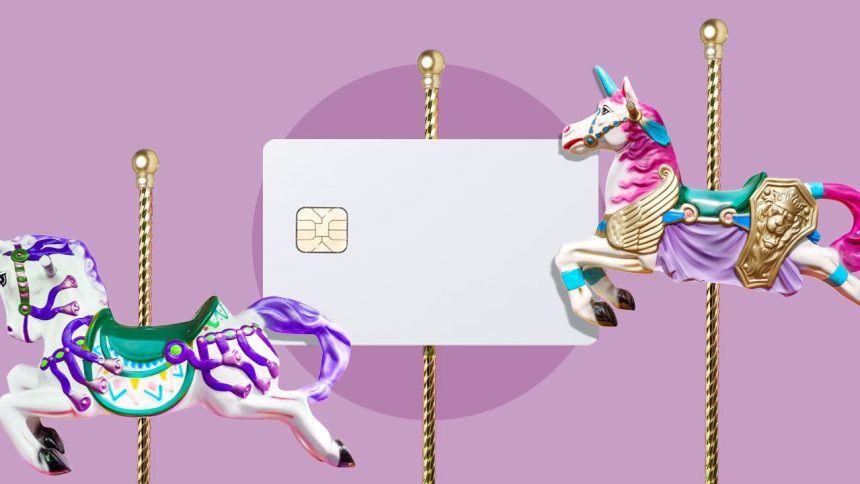Credit card debt is at an all-time high: $1.2 trillion, according to the New York Federal Reserve. And according to Bankrate’s 2025 Dealing with Debt survey, 64 percent of borrowers who carry a credit card balance month to month have delayed or avoided other financial decisions as a result of their credit card debt.
Despite the alarm bells, Americans continue to rely on the plastic in their wallets to cover emergencies and even chase travel rewards. Like any financial product, a credit card can be a worthwhile tool — if you use it right. But for too many Americans, credit cards are an anchor around their necks.
Wishful thinking is keeping consumers in credit card debt
The road to maxed-out credit cards is paved with good pay-down intentions. No one sets out to carry a credit card balance or max out their credit line, but with rising costs and other economic factors at play, Americans are having an increasingly challenging time making ends meet. Enter the credit card, a handy-dandy way to pay that bill and delay the cost. But before you know it, your credit card balance is out of control.
The data bears this out: Americans aren’t paying their balances in full each month. In fact:
I may sound like a broken record, but my message to consumers with credit card debt and plummeting credit scores is: Consolidate your credit cards and stop using them. Don’t even hang onto one.
“But Denny, I get travel rewards and free money when I make purchases,” I hear you say.
Sure, credit card rewards can be appealing, and when used correctly, credit cards can even help improve your credit score. But for most, those benefits are not worth the cost. If you carry a balance, you’re paying interest, and rates can be high — the average credit card rate is above 20 percent. That cost negates any benefit of the rewards you might earn. And besides, if you have to spend money to get the rewards, they’re not free.
Question of the month: How do I get off the credit card merry-go-round?
Ideally, you’d pay down your credit card balances using a debt payoff strategy like the snowball or avalanche method, and then reassess your spending habits to avoid getting trapped in the debt cycle again. But if your budget is just too tight to accommodate putting extra funds toward debt, consider the following:
Don’t use a balance transfer card
This is the go-to consolidation advice, and I scratch my head every time I hear it. Paying off the balance of one credit card with a new credit card keeps you in credit card debt. Balance transfer credit cards can be valuable, particularly the ones that come with a 0 percent introductory APR, but if you’re struggling with credit card debt, this product won’t solve your problem.
Bankrate’s take:
If you want to get off the credit card merry-go-round for good, ditch the plastic.
Pay off the balances with a personal loan instead
Personal loans can knock you off the spinning ride of revolving debt because they’re installment loans. They have fixed interest rates, which means a predictable monthly payment, and a set payment schedule, giving you a straightforward path to your paid-in-full date.
To minimize the cost of interest, pick the shortest debt consolidation loan term you can afford. A personal loan calculator can help you compare the monthly and overall costs of several loan options.
Consider using buy now, pay later
Buy now, pay later (BNPL) apps get a bad rap because they can be one more way to overspend. However, they have three big advantages over credit cards:
- You’re required to pay them off on a set payment schedule — there’s no minimum payment option.
- Your credit utilization ratio won’t take a hit since it’s not revolving debt.
- You won’t pay any fees or interest for the shortest repayment options.
The next time you reach for a credit card to make a purchase, ask yourself whether a BNPL loan might suit your needs better. They can be a good way to delay the full cost of a purchase without paying interest, if you’re certain you can make the payments.
But just like your credit cards, exercise caution and only use BNPL loans when truly needed. It’s not a good idea to go into debt for a burrito, after all.
Credit cards caused a lot of heartache in my mortgage days
It was always the same story: When a customer was disappointed or angry that they didn’t qualify for that smokin’ low mortgage rate I’d quoted over the phone because their credit score was too low, I knew what I’d find on their credit report.
Credit cards with balances. Sometimes the borrower had recently (but not recently enough) paid the cards down in anticipation of applying for a mortgage, or maybe they’d just cranked up the balance to earn travel or cashback rewards. Either way, the outcome was the same: a credit score drop that spiked their mortgage rate into the stratosphere.
Refinance customers had to wait and hope rates stayed low, or fork over the extra cash to buy down their rate. Purchase customers felt the squeeze of a higher rate on their budget, which reduced their buying power. Worst case, the credit card debt and subsequent credit score impact put homebuying out of reach.
Either way, it was an entirely preventable scenario that only deepened my advocacy for using credit cards sparingly, especially if you’re planning a future home purchase or refinance.
The final word from Denny, your BFF (best financial friend)
The best way to avoid the credit card merry-go-round is not to hop on in the first place. But if you’re already trapped in the revolving debt cycle, a personal loan can be a good way to stop the ride and get off.
Installment debt (like a personal loan) can be easier to repay. You know precisely when you’ll be done making payments. It doesn’t impact your credit utilization ratio (though it does affect your credit score in other ways). And you won’t be penalized for paying the “minimum amount due,” though you can always put extra money toward the principal to pay the debt off faster.
Some credit card users can charge a little here and there, earn rewards and pay off the balance every single month. That’s great. But if you find yourself regularly carrying a balance, it’s time to stop the merry-go-round of revolving debt and find a better way to manage your finances. It may be painful at first, but the results are a healthier wallet and a happier you.
Do you have a question for Denny? Email the writer at [email protected].
Read the full article here














